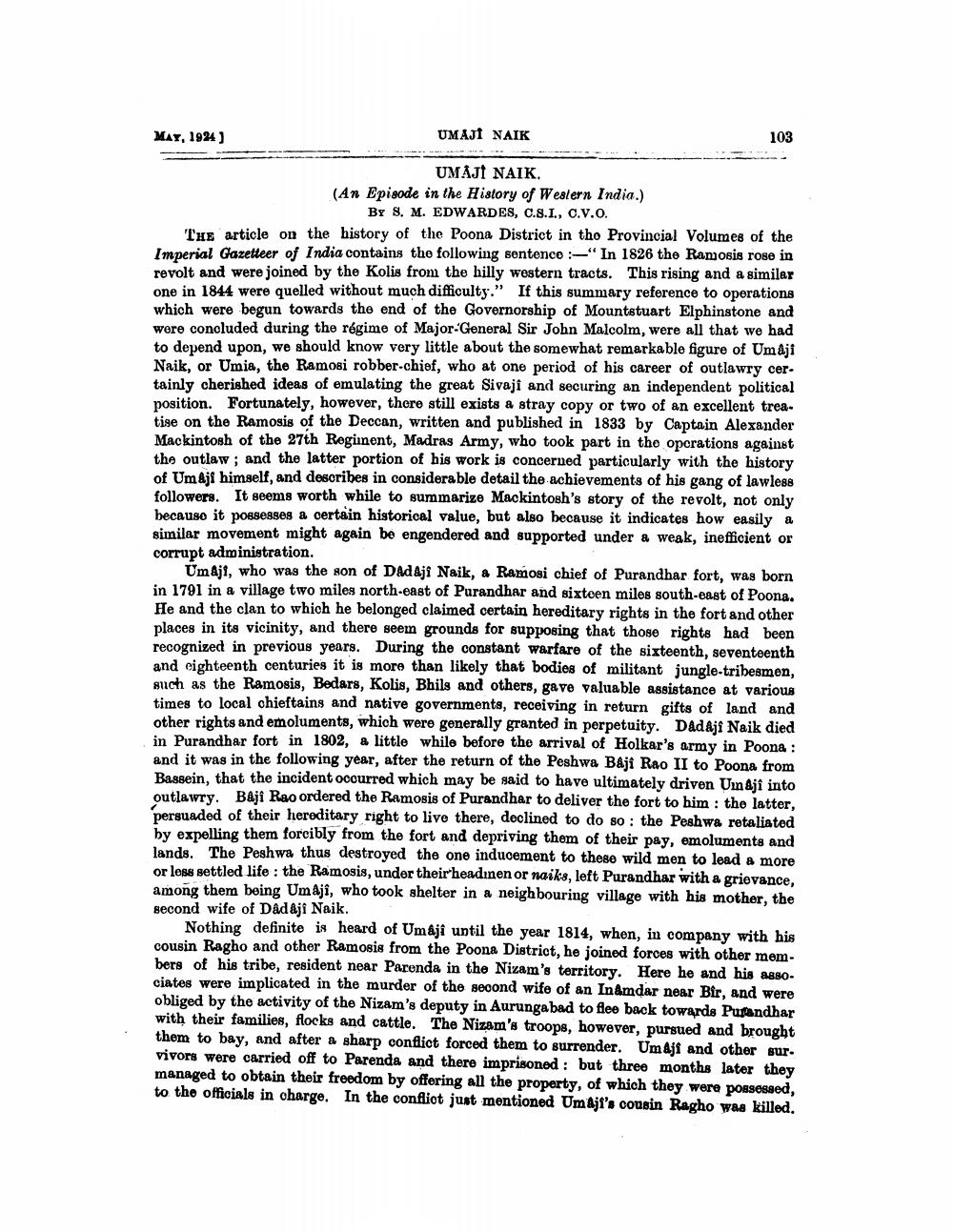________________
MAY, 1924)
UMAJI NAIK
103
UMAJI NAIK (An Episode in the History of Western India.)
BY S. M. EDWARDES, C.S.I., O.V.O. The article on the history of the Poona District in tho Provincial Volumes of the Imperial Gazetteer of India contains the following sentence "In 1826 the Ramosis rose in revolt and were joined by the Kolis from the hilly western tracts. This rising and a similar one in 1844 were quelled without much difficulty.” If this summary reference to operations which were begun towards the end of the Governorship of Mountstuart Elphinstone and were concluded during the régime of Major-General Sir John Malcolm, were all that we had to depend upon, we should know very little about the somewhat remarkable figure of Umaji Naik, or Umia, the Ramobi robber-chief, who at one period of his career of outlawry certainly cherished ideas of emulating the great Sivaji and securing an independent political position. Fortunately, however, there still exists a stray copy or two of an excellent trea. tise on the Ramosis of the Deccan, written and published in 1833 by Captain Alexander Mackintosh of the 27th Regiinent, Madras Army, who took part in the operations against the outlaw; and the latter portion of his work is concerned particularly with the history of Um Aji himself, and describes in considerable detail the achievements of his gang of lawless followers. It seems worth while to summarize Mackintosh's story of the revolt, not only because it possesses a certain historical value, but also because it indicates how easily a similar movement might again be engendered and supported under & weak, inefficient or corrupt administration.
Um Aji, who was the son of Dad Aji Naik, a Ramosi chief of Purandhar fort, was born in 1791 in a village two miles north-east of Purandhar and sixteen miles south-east of Poona. He and the clan to which he belonged claimed certain hereditary rights in the fort and other places in its vicinity, and there seem grounds for supposing that those rights had been recognized in previous years. During the constant warfare of the sixteenth, seventeenth and eighteenth centuries it is more than likely that bodies of militant jungle-tribesmen, such as the Ramosis, Bedars, Kolis, Bhils and others, gave valuable assistance at various times to local chieftains and native governments, receiving in return gifts of land and other rights and emoluments, which were generally granted in perpetuity. Dad Aji Naik died in Purandhar fort in 1802, a little while before the arrival of Holkar's army in Poona : and it was in the following year, after the return of the Peshwa Baji Rao II to Poona from Bagsein, that the incident occurred which may be said to have ultimately driven Uin Aji into outlawry. Baji Rao ordered the Ramosis of Purandhar to deliver the fort to him : the latter, persuaded of their hereditary right to live there, declined to do so : the Peshwa retaliated by expelling them forcibly from the fort and depriving them of their pay, emoluments and lands. The Peshwa thus destroyed the one induoement to these wild men to lead a more or loss settled life: the Ramosis, under their headınen or naiks, left Purandhar with a grievance, among them being Um Aji, who took shelter in a neighbouring village with his mother, the second wife of Dad Aji Naik.
Nothing definite is heard of Umaji until the year 1814, when, in company with his cousin Ragho and other Ramosis from the Poona District, he joined forces with other members of his tribe, resident near Parenda in the Nizam's territory. Here he and his associates were implicated in the murder of the second wife of an Inamdar near Bir, and were obliged by the activity of the Nizam's deputy in Aurungabad to flee back towards Purandhar with their families, flocks and cattle. The Nizam's troops, however, pursued and brought them to bay, and after a sharp conflict forced them to surrender. Umaji and other sur. vivors were carried off to Parenda and there imprisoned: but three months later they managed to obtain their freedom by offering all the property, of which they were possessed, to the officials in charge. In the conflict just mentioned Um aji's cousin Ragho was killed.




